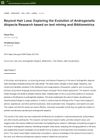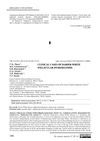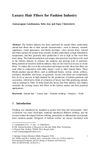 January 2009 in “Springer eBooks”
January 2009 in “Springer eBooks” The document concludes that treating skin conditions should include psychological care and a multidisciplinary approach is essential for effective management.
 8 citations,
May 2022 in “Orphanet Journal of Rare Diseases”
8 citations,
May 2022 in “Orphanet Journal of Rare Diseases” The UD-PrOZA program successfully diagnosed 18% of adult patients with rare diseases, often using genetic testing.
 June 2020 in “Journal of Investigative Dermatology”
June 2020 in “Journal of Investigative Dermatology” Getting insurance to cover the hair loss treatment tofacitinib is hard because it's not officially approved for that use.
 July 2024 in “Journal of Education For Sustainable Innovation”
July 2024 in “Journal of Education For Sustainable Innovation” Visualizing data helps guide future androgenetic alopecia research and policies.
 July 2024 in “Indian Journal of Dermatology Venereology and Leprology”
July 2024 in “Indian Journal of Dermatology Venereology and Leprology” Certain gene variations in PITX2 are linked to a higher risk of male pattern baldness in Indians.
 November 2019 in “Harper's Textbook of Pediatric Dermatology”
November 2019 in “Harper's Textbook of Pediatric Dermatology” Understanding normal hair growth and loss in children is key to diagnosing and treating hair disorders.
 12 citations,
February 2021 in “Translational Psychiatry”
12 citations,
February 2021 in “Translational Psychiatry” Researchers found two new genetic variants linked to Alzheimer's disease.
 October 2022 in “Medičnì perspektivi”
October 2022 in “Medičnì perspektivi” Darier-White disease causes skin and nail issues, starts around age 20, worsens until 40-50, and has poor treatment options.
 November 2016 in “Elsevier eBooks”
November 2016 in “Elsevier eBooks” Genetic mutations can affect female sexual development, requiring personalized medical care.
 138 citations,
October 2012 in “Behavioral Ecology”
138 citations,
October 2012 in “Behavioral Ecology” Masculine facial features may not reliably indicate heritable health, and more research is needed.
 58 citations,
December 2018 in “Nature Communications”
58 citations,
December 2018 in “Nature Communications” Male pattern baldness is mostly inherited, involves many genes, and is linked to other traits like early puberty and strong bones.
 June 2023 in “International journal of biology, pharmacy and allied sciences”
June 2023 in “International journal of biology, pharmacy and allied sciences” New medications are improving depression treatment, emphasizing accurate diagnosis and chronic care.
 16 citations,
December 2006 in “Expert Review of Dermatology”
16 citations,
December 2006 in “Expert Review of Dermatology” Hair follicles are essential for skin health, aiding in hair growth, wound healing, and immune function.
 September 2022 in “Plastic and Reconstructive Surgery”
September 2022 in “Plastic and Reconstructive Surgery” Baricitinib helps with severe hair loss, negative-pressure therapy lowers hernia recurrence, tranexamic acid reduces bleeding, robot-assisted breast surgery may improve outcomes, and acellular dermal matrix could decrease breast reconstruction complications.
 1 citations,
April 2018 in “Lasers in Surgery and Medicine”
1 citations,
April 2018 in “Lasers in Surgery and Medicine” New treatments and technologies in laser medicine show promise for improving skin conditions, fat reduction, cancer treatment, wound healing, and hair restoration.
 4 citations,
September 2014 in “Elsevier eBooks”
4 citations,
September 2014 in “Elsevier eBooks” Use some skin medications with caution during pregnancy; avoid strong steroids, certain eczema treatments, and systemic retinoids, but many topical treatments and nasal sprays are safe.
66 citations,
June 2020 in “Advanced Intelligent Systems” Surgical robots have improved but still can't perform tasks or make decisions on their own.
 February 2024 in “Biomedicines”
February 2024 in “Biomedicines” Hormones like androgens, estrogen, thyroid hormones, and stress hormones can contribute to hair loss, and treatments target these hormonal imbalances.
 65 citations,
July 2013 in “International Clinical Psychopharmacology”
65 citations,
July 2013 in “International Clinical Psychopharmacology” Mood stabilizers like lithium and anticonvulsants have side effects that can lead to patients stopping their medication, and managing these effects is important for treatment adherence.

Researchers found a genetic link for hereditary hair loss but need more analysis to identify the exact gene.
 6 citations,
January 2016 in “Environmental footprints and eco-design of products and processes”
6 citations,
January 2016 in “Environmental footprints and eco-design of products and processes” The industry should promote pure luxury hair fibers, improve technology, and diversify products to support growers and ensure sustainable use.
 5 citations,
September 1986 in “Pediatric Dermatology”
5 citations,
September 1986 in “Pediatric Dermatology” A family showed a new condition with inherited hair loss and skin changes, possibly due to one genetic disorder.
 January 2017 in “Elsevier eBooks”
January 2017 in “Elsevier eBooks” Antioxidants may help improve mitochondrial health and could be used to treat diseases related to cell damage.
June 2020 in “Journal of Investigative Dermatology” The symposium highlighted the importance of genetics in understanding and treating complex skin diseases.
 4 citations,
October 2022 in “Journal of Imaging”
4 citations,
October 2022 in “Journal of Imaging” An intelligent system can classify hair follicles and measure hair loss severity with reasonable accuracy.
 10 citations,
August 2023 in “Advanced Science”
10 citations,
August 2023 in “Advanced Science” Nitric Oxide has potential in medicine, especially for infections and heart treatments, but its short life and delivery challenges limit its use.
February 2024 in “Medicina” AFM can diagnose hair disorders by revealing detailed hair surface changes.
 3 citations,
September 2022 in “Frontiers in veterinary science”
3 citations,
September 2022 in “Frontiers in veterinary science” Melatonin affects cashmere growth in goats by influencing stem cell and certain signaling pathways.
1 citations,
November 2022 in “Aaps Pharmscitech”  7 citations,
August 2022 in “Journal of Nanobiotechnology”
7 citations,
August 2022 in “Journal of Nanobiotechnology” Advancements in nanoformulations for CRISPR-Cas9 genome editing can respond to specific triggers for controlled gene editing, showing promise in treating incurable diseases, but challenges like precision and system design complexity still need to be addressed.


























